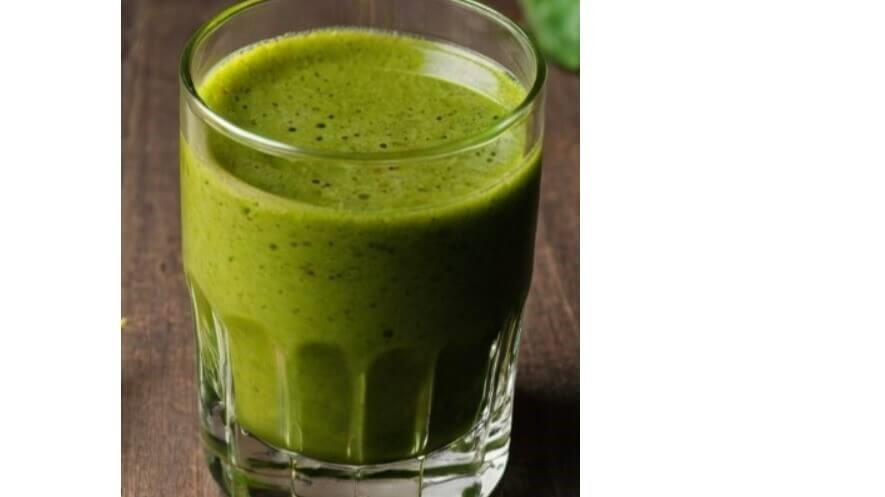Giloy (Tinospora cordifolia) is a well-known herb in Ayurveda, India’s ancient healing system. It has been traditionally appreciated for its ability to revitalize the body and support overall restoration. Ayurvedic texts describe Giloy as an herb that helps balance the body and strengthens its ability to fight illness. Modern research has started exploring its health potential, but most studies so far have been conducted in animals or lab settings, and high-quality clinical evidence in humans is limited. Giloy is rich in bioactive compounds that may have antioxidant, anti-inflammatory, fever-reducing, anti-diabetic, antibacterial, and potential immunity-boosting properties. Giloy, also known as Guduchi, is a herbaceous climbing vine traditionally used in Ayurveda for its potential health-supporting properties. While the entire plant is used in traditional healing practices, the stem is most frequently chosen for making giloy juice. This juice is traditionally consumed to promote overall well-being. It is especially popular for boosting immunity and aiding natural detoxification. In the following sections, we will explore the potential Giloy juice benefits when used with appropriate care and guidance.
What is Giloy Juice?
Giloy has long been used in traditional medicine to promote general well-being. All parts of the plant—including its stems, leaves, and roots—are considered beneficial, but the stem is regarded as the most therapeutically valuable. Giloy juice is an herbal preparation made primarily from the stem of the plant. It is valued in Ayurvedic practice due to the presence of bioactive and water-soluble compounds that are believed to support various health functions.
Other Common Names of Giloy
Giloy, botanically known as Tinospora cordifolia, is also referred to by several other names including Guduchi, Amrita, Ambervel, Giloe, Madhuparni, Amritavallari, Rasayani, Vatsadani, Jwarari, Bahuchinna, Heart-leaved Moonseed, Indian tinospora, Jetwatika, Mehaghna, Pramehahara, and Sindal.
How to Make Giloy Juice At Home
Making giloy juice at home allows you to get its benefits along with freshness and purity. The method is simple and follows traditional Ayurvedic practices. It is important to seek guidance from a qualified Ayurvedic expert or healthcare professional before beginning any herbal treatment.
Fresh giloy stems are typically used to prepare the juice. Here’s a step-by-step guide based on traditional Ayurvedic wisdom:
Ingredients:
- Take 1-2 fresh giloy (Tinospora cordifolia) stems
- 2 glasses of clean drinking water
- Honey/Lemon (optional, for taste)
Giloy Juice/Kadha Recipe Steps:
Step 1: Thoroughly clean the giloy stems under running water to ensure they are free from any dirt, dust, or external impurities.
Step 2: Cut the stems into small pieces and boil them in 2 glasses of water for about 10-15 minutes. Keep boiling the mixture until the water level drops to about half its original quantity. This helps extract the active compounds from the stems.
Step 3: Once the stems soften, you can either:
- Option A: Strain the decoction (kadha) and allow it to cool – this is commonly referred to as giloy juice in traditional usage.
- Option B: Crush or blend the softened stems with a small amount of the decoction to get a thicker juice. Then strain before drinking.
Step 4: Optionally, add a few drops of lemon juice or a teaspoon of honey to enhance the taste – but avoid this step if advised otherwise by your doctor (especially if diabetic).
Giloy stems contain naturally occurring phytochemicals such as alkaloids, glycosides, flavonoids, saponins, resins, tannins, and plant-based steroids. These compounds are currently under study for their possible antioxidant, anti-inflammatory, and adaptogenic roles in supporting general well-being. However, scientific evidence in human populations is still limited, and giloy should not be used as a replacement for medical treatment.
Usage and Dosage of Giloy Juice
Giloy juice is typically consumed orally and is often considered more convenient than other forms like powders or capsules. It can be taken on its own or mixed with water or natural sweeteners like honey to improve the taste. When combined with other herbal preparations, giloy juice may have synergistic effects, as described in traditional Ayurvedic practices.
The right dosage can differ based on factors such as a person’s age, overall health, and the type or concentration of the juice being used. Always follow the directions provided on the product label or consult an Ayurvedic practitioner or healthcare provider before use.
Nutritional Value/Phytochemical Profile of Giloy Juice
Giloy juice contains a broad spectrum of bioactive phytochemicals that are believed to support various physiological functions. These naturally occurring compounds are found in different parts of the plant and have been studied for their potential therapeutic properties:
- Alkaloids (from stem and root): These compounds are being researched for their possible role in supporting the body’s response to infections, neurological conditions, and metabolic disorders.
- Glycosides (from the stem): Preliminary studies suggest glycosides may help support neurological health and may be relevant in the context of age-related cognitive conditions.
- Diterpenoids (from the whole plant): These plant-based chemicals have demonstrated anti-inflammatory, antimicrobial, and vasorelaxant properties in lab-based studies. They may contribute to overall cardiovascular and immune system support.
- Steroids (from aerial parts of stem): Plant steroids in Giloy may play a role in maintaining bone and joint health and have been evaluated for their potential in managing inflammatory conditions like arthritis.
- Aliphatic Compounds (from the whole plant): These compounds are under investigation for their possible anti-inflammatory and pain-relieving (anti-nociceptive) effects.
- Giloin and Tinosporic Acid (from the root): These constituents are beinfg explored for their calming effects and potential antiviral activity, including early-stage studies related to immune function.
Together, these phytochemicals make Giloy juice a subject of ongoing interest in both Ayurveda and scientific research, particularly for its adaptogenic and immunomodulatory properties.

20 Potential Giloy Juice Benefits – Tradition & Research-Backed
Tinospora cordifolia, commonly known as giloy, has held an important place in Ayurvedic healing traditions for hundreds of years. In recent years, it has also attracted growing scientific interest due to its rich profile of bioactive compounds found in its stem and root. These compounds are being investigated for their potential role in supporting various physiological functions.
While promising, most of these findings are based on preliminary studies, traditional use, and lab-based research. Individuals should always consult a qualified healthcare provider before using giloy juice for health purposes. Below are some of the potential giloy juice benefits identified through traditional use and early scientific exploration:
1.) Supports Immune Function
Giloy has long been regarded in Ayurveda for its immunomodulatory effects. Initial research suggests that certain compounds in giloy may help stimulate immune cells such as macrophages and T-cells, which are essential for defending the body against infections. When used appropriately and under the guidance of a healthcare professional, giloy juice may contribute to maintaining a healthy immune response.
2.) Rich in Antioxidants
One of the key giloy juice benefits is its antioxidant activity. The juice contains naturally occurring compounds like flavonoids and polyphenols, which help combat oxidative stress by neutralizing free radicals. Oxidative stress is linked to aging and several chronic health issues. By supporting antioxidant defenses, Giloy juice may help protect cellular health and contribute to overall well-being.
3.) Potential Anti-inflammatory, Anti-arthritic, and Bone-Supportive Effects
According to Ayurvedic texts, giloy has traditionally been used to manage inflammatory symptoms, such as those seen in gout or rheumatoid arthritis. It is also noted for helping relieve symptoms such as joint pain and inflammation.
Contemporary studies are exploring its role in modulating inflammatory markers and supporting bone integrity. Some animal-based research indicates Giloy’s potential in reducing fever and inflammation, although more clinical trials are needed to confirm these effects in humans.
4.) May Help Manage Fever (Antipyretic Potential)
Giloy has been traditionally used in Ayurveda for managing fevers. Some preliminary studies suggest that certain compounds in Giloy may help regulate body temperature during febrile conditions by modulating the immune response. However, more clinical evidence is required to establish its effectiveness and safety for this use in humans.
Laboratory-based research has shown that extracts of giloy may exhibit antibacterial and antiviral properties. These findings suggest potential in supporting the body’s natural defense mechanisms. However, Giloy juice should not be relied upon as a substitute for medically prescribed treatments for infections.
6.) May Support Blood Sugar Regulation
Ayurvedic texts have long referenced giloy’s use in managing symptoms associated with diabetes. Some modern studies indicate that giloy may help improve insulin sensitivity and reduce elevated blood glucose levels. While these findings are promising, giloy juice should be used with caution and only under professional guidance, especially by individuals with diabetes or those on anti-diabetic medication.

7.) Potential Giloy Juice Benefits for Liver
Animal studies have explored the hepatoprotective (liver-protecting) properties of giloy. These studies suggest that certain bioactive compounds in the plant may help safeguard liver cells form the damage caused by toxins or oxidative stress. Though these results are encouraging, human studies are limited, and more research is needed to confirm its safety and efficacy for liver health.
8.) Giloy Juice Benefits for Heart Health
One of the emerging giloy juice benefits is its potential to support cardiovascular wellness. Traditional Ayurvedic texts and some early scientific studies suggest that compounds in giloy may help in regulating cholesterol levels and maintaining healthy blood pressure.
While these findings are promising, more clinical trials are needed to confirm its role in heart health. Individuals with cardiovascular conditions should always consult a healthcare provider before using herbal supplements.
9.) Under Research for Anticancer Properties
Giloy has been investigated in laboratory (in vitro) studies for its potential anticancer activity. Some research indicates that its bioactive compounds may help inhibit the growth of abnormal cells. However, it’s important to note that these are early-stage findings, and giloy juice is not a substitute for cancer treatment. Any potential giloy juice benefits in this regard must be considered with caution and professional guidance.
10.) Potential Cognitive Benefits of Giloy Juice
In Ayurveda, giloy is considered a tonic for the brain, and early studies suggest it may have adaptogenic and neuroprotective properties. It is believed to enhance memory, focus, and learning capacity. Some anecdotal accounts also suggest its potential in managing mild behavioral concerns. However, claims such as improved IQ or behavioral outcomes require robust scientific validation. Use of giloy juice for cognitive support should be approached with informed medical advice.
11.) May Help Manage Stress
Giloy juice is traditionally believed to have adaptogenic effects, which may support the body’s ability to manage physical and emotional stress. Some studies suggest that it may influence stress-regulating hormones and support mental well-being. Regular use, under appropriate supervision, may promote resilience against everyday stressors. However, remember that it is not a replacement for psychological or medical care.
12.) May Support Respiratory Health
Giloy is traditionally used in Ayurveda for respiratory issues due to its mucolytic and anti-inflammatory properties. According to some reports, giloy juice may help with conditions such as cough, asthma, and bronchitis. While traditional use is supportive of these claims, scientific evidence in human populations is still evolving.
13.) Aids Digestive Wellness
Digestive support is another area where giloy juice benefits have been highlighted in Ayurveda. It is traditionally used to manage issues such as indigestion, acidity, and constipation. Some studies suggest it may have a positive effect on gut health by modulating digestive enzymes and reducing inflammation.
14.) May Help with Allergies
Giloy is known in traditional medicine for its potential anti-allergic effects. Some research suggests that it may help regulate immune responses, which could reduce symptoms like sneezing, congestion, or itching. Giloy juice benefits in this area are mostly anecdotal or based on early-stage research, and it should not be used as a standalone remedy for allergic conditions without medical oversight.

15.) May Support Skin Health
Giloy juice is traditionally used to promote clear and healthy skin. Its antioxidant and anti-inflammatory properties are believed to help reduce skin issues such as acne, blemishes, and dullness. While these effects are largely supported by traditional use and early research, more clinical studies are needed to confirm its direct benefits for skin health.
16.) Helps in Weight Management
One of the lesser-known giloy juice benefits may include support for weight management. It is believed to assist the body’s natural detoxification process and improve metabolism, which may indirectly contribute to maintaining a healthy weight. However, it should be noted that no herbal remedy should replace a balanced diet and exercise.
17.) May Support Menstrual Wellness
Giloy juice has been used in traditional practices to help maintain hormonal balance and support menstrual regularity. Some anecdotal evidence suggests it may help reduce mild discomfort during menstruation. However, individuals with menstrual concerns should consult a qualified healthcare provider before using any herbal supplement.
18.) Giloy Juice Benefits for Fertility Support
Giloy’s adaptogenic properties may help support fertility by reducing stress, enhancing immunity, and promoting hormonal balance. These elements may influence reproductive well-being. While these giloy juice benefits are promising from a traditional standpoint, scientific validation through human clinical trials is still limited.
19.) May Help Regulate Uric Acid Levels
High levels of uric acid can lead to gout and joint inflammation. Giloy juice has been explored for its anti-inflammatory and antioxidant properties, which may help reduce joint pain and swelling associated with elevated uric acid levels.
Some traditional uses and early studies also suggest that giloy may support the liver and kidneys – organs vital for processing and eliminating uric acid. Additionally, by supporting detoxification, giloy juice may contribute to the natural regulation of uric acid in the body. However, these potential giloy juice benefits should be considered complementary and not a substitute for medical treatment.
20.) Giloy Juice Benefits for Hair
Hair health is often linked to overall health. Stress is a common factor behind hair fall and premature greying. Giloy juice may play an indirect role in maintaining your mane’s health. Its ability to support immunity, reduce stress, and enhance digestion may contribute to healthier hair and scalp. Giloy’s adaptogenic effects may help manage the concerns related to hair. Additionally, by supporting better nutrient absorption through improved digestion, giloy juice may aid in maintaining healthy hair growth.
Giloy Juice Side Effects and Precautions
While giloy juice is widely used in Ayurvedic medicine and has shown potential in various health-supporting roles, it is essential to be aware of its possible side effects and safety considerations. Like any herbal remedy, giloy juice benefits should be weighed against individual health conditions and risks.
1.) Autoimmune Conditions
Giloy may stimulate immune activity. While this is generally considered beneficial, it can be a concern for individuals with autoimmune diseases such as rheumatoid arthritis, lupus, or multiple sclerosis. Increased immunity may worsen symptoms in such conditions. Individuals with autoimmune disorders should avoid using giloy unless advised otherwise by a qualified healthcare professional.
2.) Blood Sugar and Surgery
Giloy may have an effect on blood sugar levels. This may interfere with blood sugar control during or after surgery, posing potential risks. Hence, it is advisable to stop using giloy at least two weeks before any planned surgery.
3.) Medication Interactions
Giloy may interact with immunosuppressant drugs by enhancing immune system activity, which could reduce the effectiveness of these medications. Additionally, if you are taking anti-diabetic medications, giloy may further lower blood glucose levels. In such cases, regular monitoring of blood sugar and physician guidance is strongly advised.
4.) Pregnancy and Breastfeeding
There is currently insufficient scientific evidence suggesting the safety of giloy juice during pregnancy or breastfeeding. Therefore, its use during these periods is not recommended without medical supervision.
5.) Allergic Reactions
Although uncommon, certain individuals might experience allergic reactions to giloy. Use in such cases should be avoided.
6.) General Safety
When used short-term and in recommended dosage, giloy juice is generally considered safe for most individuals. However, self-medication, excess quantity or prolonged usage without proper consultation may increase the risk of adverse effects.
Also Read:
- 14 Best Ayurvedic Herbs for Daily Use
- Oregano Herb Tea Benefits, Side Effects, & Recipes
- Amla Juice Benefits for Skin: Nature’s Elixir for Radiance
Takeaway Message
Giloy holds a long-standing historical significance, originating from India. Hindu mythology refers to giloy as ‘Amrita’, or the ‘elixir of immortality’. It has been used for centuries due to its traditional health-supporting properties. In addition to its cultural and Ayurvedic significance, modern-day researchers have also begun studying the potential giloy juice benefits. However, like any medicinal herb, it should be consumed in moderation. Always follow the recommended dosage instructions provided on the product label and consult a qualified healthcare professional or Ayurvedic practitioner before starting giloy juice, especially if you have an existing health condition or are taking medications.
Disclaimer: This content is intended for informational purposes only and should not be considered a substitute for professional medical advice, diagnosis, or treatment. Always consult a qualified healthcare provider before making health decisions or trying new herbal remedies.
Q1.) What is giloy juice?
Ans.) Giloy juice is made from the stems of the giloy plant, an Ayurvedic herb known for boosting immunity and vitality. Giloy is a very important plant in Ayurveda.
Q2.) How does giloy juice support immunity?
Ans.) Its antioxidants and anti-inflammatory compounds strengthen the immune system and fight infections.
Q3.) Can giloy juice help with stress?
Ans.) Yes, its adaptogenic properties help reduce stress and improve mental clarity. In addition, incorporating yoga and meditation into your routine may enhance the overall giloy juice benefits.
Q4.) How do I consume giloy juice?
Ans.) I usually take 10-20 ml of Giloy juice diluted in water and drink it on an empty stomach in the morning. Still, it’s advisable to seek guidance from a qualified healthcare provider before adding any new supplement to your routine.
Q5.) Does giloy juice benefit skin health?
Ans.) Yes, it detoxifies the body, reducing acne and promoting a healthy glow. Along with this, follow a healthy diet for better results.



Nice